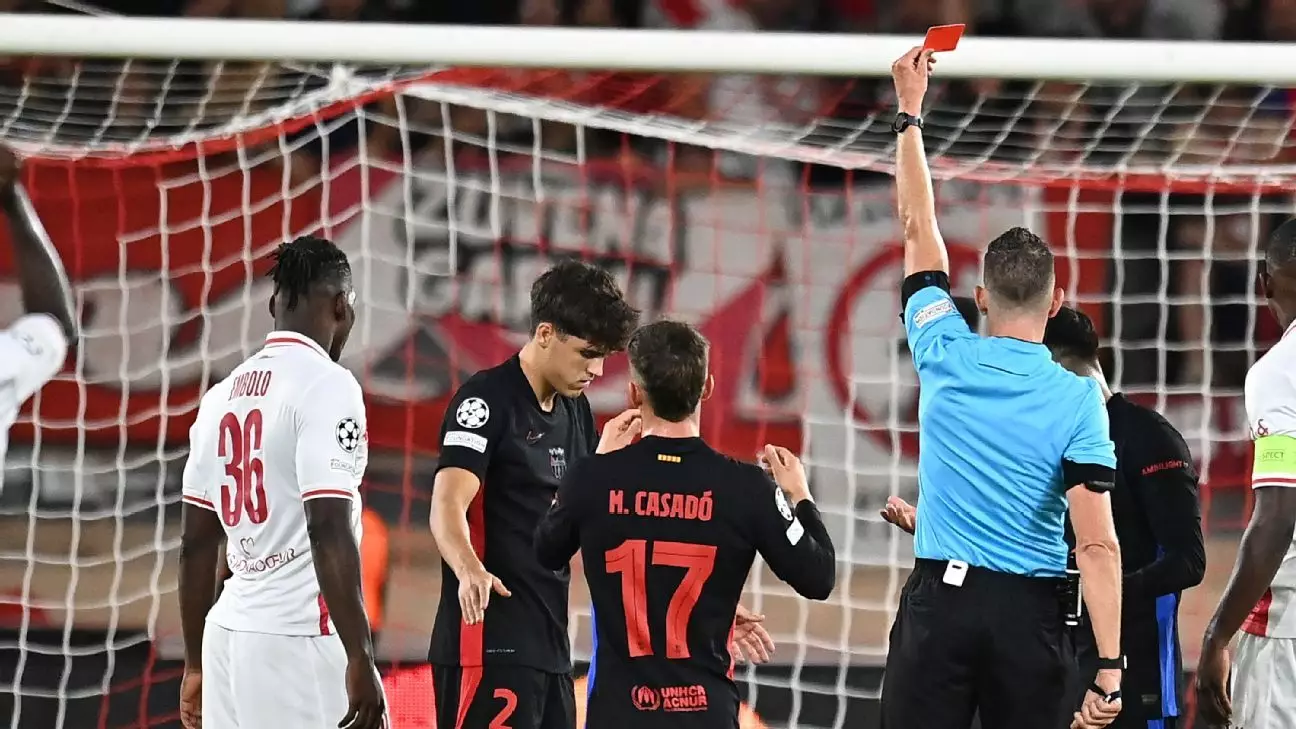Barcelona’s first defeat of the season under the strategic guidance of coach Hansi Flick came as they faced off against a determined AS Monaco side. The match, held at the Stade Louis II, saw the Catalan giants embark on a challenging trajectory after Eric García received a red card just ten minutes into the game. This early dismissal drastically altered the dynamics of the match, forcing Barcelona to adapt rapidly to a situation that would unravel much of their initial game plan.
García’s expulsion for a last-man challenge effectively set the tone for a game that saw Barcelona struggle to regain control. The influence of this decision cannot be understated, as it not only compelled the players to adjust their approach but also handed Monaco a significant psychological advantage. The immediate consequence was that Barcelona had to defend with ten men against a side known for its pace and aggression, a daunting task that ultimately led to their defeat.
Despite the setback, Flick highlighted several positive aspects of Barcelona’s performance, notably their collective resilience. Following Lamine Yamal’s equalizing goal, Barcelona demonstrated a commendable fighting spirit, attempting to stay organized defensively while also looking for offensive opportunities. Flick’s remarks indicated a sense of optimism about the team’s cohesiveness and ability to adapt, despite the challenging circumstances.
However, one must question the tactical execution and decision-making following the red card. Flick maintained that the team defended with passion and attempted to shut down Monaco’s attacking threats, but they still conceded two goals. This raises concerns about whether Barcelona’s defensive strategies are robust enough, especially against opponents that can exploit numerical advantages. Their inability to maintain their competitive edge after the sending-off could suggest vulnerabilities that may be exploited in future matches.
The loss to Monaco places additional pressure on Barcelona as they move forward in their Champions League campaign. Flick’s assertion that his squad possesses the strength to qualify for the knockout stages should be taken with both hope and caution. Indeed, the redesigned structure of the tournament allows for some leniency, but the fact remains that they must capitalize on upcoming matches against teams like Bayern Munich and Borussia Dortmund.
Historical performance in the tournament raises eyebrows regarding Barcelona’s capacity to overcome their Champions League jinx. Having failed to reach the knockout rounds in two of the last three seasons, one must question whether the current squad has the mental fortitude to navigate the pressures of high-stakes European football. Each subsequent match will serve as a litmus test for Barcelona’s resilience and adaptability.
In analyzing the circumstances surrounding the defeat, it is clear that Barcelona must evaluate their approach to both defending and maintaining composure in high-intensity situations. As reflected in the post-match sentiments of goalkeeper Marc-André ter Stegen, misunderstandings can have cascading effects on team performance. A recurring theme appears to be an inability to cope with adversity, particularly when faced with sudden setbacks.
Moreover, Flick addressed the return of Ansu Fati, a player whose presence is expected to invigorate the squad. His return from injury is notable, as Fati’s prior record as the youngest scorer in Champions League history suggests potential. However, the reliance on young talent like Fati and emerging stars such as Yamal also exposes a fragility in squad depth. The expectation for these players to consistently deliver may result in undue pressure that could hinder their development.
While the defeat against Monaco was disheartening, it serves as a pivotal learning moment for Barcelona. Flick’s insistence on maintaining morale and progressing through adversity is crucial for building a competitive mindset. The real test will be how the team reacts, particularly in their next Champions League encounter against Young Boys.
As the campaign unfolds, Barcelona must work both on their tactical flexibility and psychological resilience. This will not only be vital for their Champions League ambitions but also essential for restoring their status as a dominant force in European football. Ultimately, the key takeaway is that setbacks like these can serve as springboards for future success—if the team channels the pain of defeat into constructive improvement.

